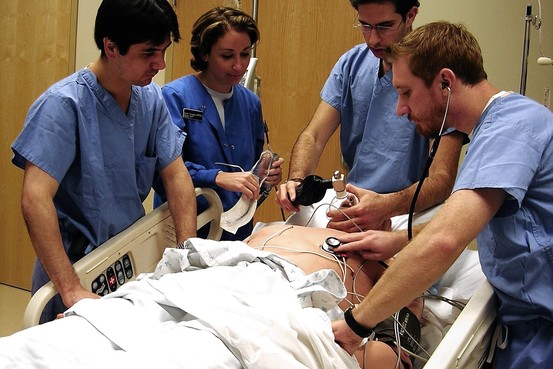Doctors Upset Over Skill Reviews
New Learning Requirement to Maintain Certifications Called Costly, Irrelevant
By
MELINDA BECK
July 21, 2014 7:27 p.m. ET

A new program mandates that physicians take more courses to maintain their board standing. Anesthesiologists practice on a simulator. American Society of Anesthesiologists
The medical community is embroiled in a bitter debate about what board-certified physicians should be required to do to prove that their knowledge and skills are up-to-date.
Besides holding a state medical license, about 75% of U.S. doctors are certified by 24 privately run boards, signifying that they have mastered their area of specialty, in fields ranging from internal medicine to orthopedics. The specialty boards require their physicians to pass rigorous exams, generally every 10 years, to stay certified.
In recent years, those boards also have begun requiring doctors to enroll in official Maintenance of Certification programs in between exams to show they are committed to lifelong learning and quality improvement.
The American Board of Internal Medicine, the largest specialty board with more than 250,000 members, put its new MOC requirements into effect in January. Internists must earn points every two, five and 10 years by completing so-called modules on medical knowledge and practice assessment, with activities such as surveying patients on their communication skills and reviewing charts to identify ways to improve care. Board officials say the program takes five to 20 hours a year and costs $1,940 over 10 years, including the exam; or $2,260, including recertification in sub-specialties such as cardiology or pulmonology.
Lois Nora, president of the American Board of Medical Specialties, which oversees the 24 boards, says the public trusts board certification to be the gold standard for physicians, and taking a test every 10 years is no longer sufficient to keep up—especially given the increasing focus on quality measures in health care.
"Most practicing physicians have not had formal courses in patient safety or quality improvement. MOC is a structured way to make sure that is happening," she said.
But in a flurry of angry editorials and letters to newspapers and medical journals,websites and blog posts, many doctors are deriding the MOC requirements as costly, irrelevant and time-consuming, and largely a moneymaking venture for the specialty boards.
Many contend there is no research showing that the MOC activities improve patient care and complain that they already are overburdened with paperwork, including logging many hours in continuing-education courses required to maintain their medical licenses. Those requirements are set by state medical boards and are separate from specialty-board certification.
"No one wants to come out and say they're against quality, but most physicians find these modules to be cumbersome and, frankly, a joke," said Richard Armstrong, a board-certified surgeon and CEO of Docs4PatientCare, one of several doctors groups opposing MOC.
Last month, the American Medical Association's House of Delegates called for an independent evaluation of MOCs' impact on physicians and patients.
The American Board of Internal Medicine's program has come in for particular criticism. Since April, more than 17,000 physicians have signed an online petition calling for the board to waive all its MOC requirements except the exam every 10 years.
A recent survey by the American College of Cardiology, whose members are almost all board-certified internists, found that 87% opposed the MOC requirements. The American Association of Clinical Endocrinologists, whose members are also internists, expressed "strong concern" that MOC programs are creating a barrier to patient care by monopolizing physician time and driving some to stop practicing rather than comply.
Richard Baron, CEO of the American Board of Internal Medicine, says some doctors are not as up-to-date as they think they are. The pass rate for internists on the 10-year exam has dropped from 90% five years ago to 65% this year. When they don't pass the exam, "it's a wake-up call. And then they study and the ultimate pass rate goes up to 95%," he notes.
Many of the MOC activities, he says, are in keeping with new demands on doctors to show quality improvements. "In the past, doctors might be tested on what good glucose numbers are, and what medications to use. Now there is increasing emphasis on knowing, of the patients I saw last year, what percent did I achieve good glucose control in?"
The Association of American Physicians and Surgeons, a conservative group, has filed suit in federal court charging the American Board of Medical Specialties with restraint of trade. Even though the ABMS notes that maintaining board certification is "voluntary," many physicians say they have no choice because board certification is often required to have hospital privileges or join insurance networks. Those who decline are listed as "Not Meeting MOC Requirements" on the ABMS website where patients can check doctors' credentials.
In a statement, the ABMS said the lawsuit's claims "are without merit." The group says over 500,000 of the more than 800,000 board-certified physicians have enrolled in MOC programs to date. Many of the rest are exempt because they were certified before 1990, when the designation was good for life.
The ABMS also says it has arranged with some 32 major health systems, including the Mayo Clinic and M.D. Anderson Cancer Center, for their own in-house quality-improvement projects to satisfy some MOC requirements for their doctors.
But physicians in private practices say that leaves them at a disadvantage in complying, without the support of that larger infrastructure. Studying, traveling to distant test sites and review programs and paying other doctors to care for their patients while they are away all add to the cost, they say.
Some critics fear MOC programs eventually may be required to maintain state medical licenses. But Humayun Chaudhry, president and CEO of the Federation of State Medical Boards, says that fear is unfounded. The federation is devising its own program to stress professional development, called Maintenance of Licensure, and says that MOC could be one way for doctors to meet those goals, depending on what each state board decides. "We are not trying to devise more hoops for physicians to jump through," Dr. Chaudhry insists.
State boards also can reject the federation's Maintenance of Licensure program entirely—and several, including New York, Ohio, Texas and Florida, already have passed resolutions against making it or MOC a condition of licensure.
Write to Melinda Beck at HealthJournal@wsj.com

